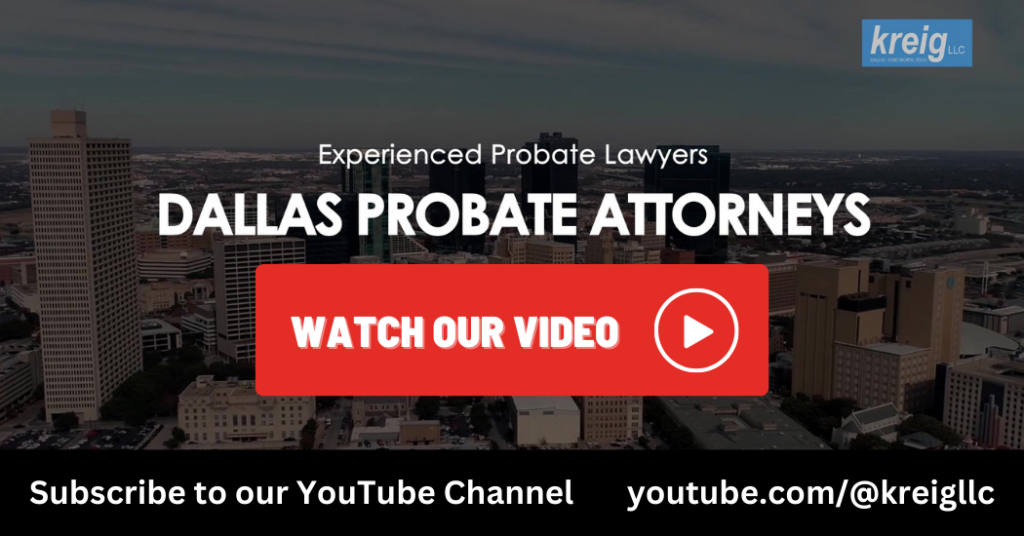Losing a parent is a heart-wrenching experience. When your departed parent has not left behind a will, which is referred to as “dying intestate,” the process can become more complex and daunting.
Under these circumstances, the decedent’s estate is distributed in accordance with Texas intestacy laws. These laws are nuanced and difficult to apply if the family situation does not just include a surviving spouse.
This article will discuss two common hypothetical cases involving a daughter grappling with the aftermath of her father’s death, who died intestate, and demonstrate how a probate attorney can help with the process in each case.
The Hypothetical Scenarios
Scenario 1: The Uncontested Probate
Consider the situation where a father was living alone in Dallas County.
He was survived by one daughter who was living out of state. The daughter had her own family and job and was busy trying to keep up with everything she had going on.
The daughter checked in with her father regularly by phone and brought her children by to see their grandpa every few years.
There is also a son who has not been seen in decades–since the time he got into a physical altercation with the father. The son is known to be in and out of jail and to have drug and other problems, but his current whereabouts are unknown.
As far as the daughter knew, the father passed away without leaving a will, leaving behind assets worth approximately $600,000, including properties.
Scenario 2: The Contested Probate
The facts are exactly the same as Scenario 1, above, but there is a third party involved.
Recently the father had started mentioning to the daughter a female companion that he had met in the past few years. Shortly thereafter the female companion had moved in with him in his house in Dallas. The daughter met the live-in companion once and the daughter had been happy that her father had someone around to help.
A few years went by. The live-in companion did not timely notify the daughter of the father’s hospitalization. She was also kept uninformed about her father’s health until just days before he died. The hospital needed someone to make decisions and contacted the daughter as it was unclear if her father’s relationship with a woman in Dallas County was recognized as a lawful marriage.
The daughter was happy that the live-in companion arranged for the funeral and the daughter thought she would get back to her father’s last affairs a few months after the funeral.
Unbeknownst to the daughter, the live-in companion had the father sign a will leaving the entire estate to her and she had started the probate process immediately after the father died. She did not tell the daughter about the will or probate. The daughter did not learn of them until just before the live-in companion was appointed as the executor.
Scenario 1: The Uncontested Probate
The first step in this scenario is to secure the decedent’s property and arrange for the funeral. This means a trip to Dallas to get things in order. It also means calling a probate attorney in Dallas in advance to get some guidance.
The probate attorney provides a list of contacts in Dallas to sell the real estate, and instructions on what records the daughter should start working on getting from third parties.
In the meeting with the probate attorney when she gets to Dallas, the following issues are considered:
- When someone passes away without a will in Texas, their property is distributed according to the state’s intestacy laws. This means that the absent brother is an equal beneficiary of the estate. If reasonable searches cannot reach the brother, a private investigator needs to be used to locate the brother.
- The assets consist mostly of bank accounts and real estate. The daughter secured the real estate by changing the locks, and removed the valuable items and keepsakes to secure storage nearby, and explained the situation to the neighbors enlisting their help to watch the property.
- The daughter got the real estate agent lined up and has a crew ready to clean out the house and sell the contents as soon as she is legally allowed to do so.
The probate attorney is able to contact the brother and work out terms for waiving his rights to the estate for a smaller guaranteed payment. The daughter is able to handle the estate from her out-of-state home. This includes attending the court hearings by zoom online, and then by following the checklists and guidance of the probate attorney. Distributions are made and the estate is closed.
The entire process took a year to complete as there were not other issues that delayed the probate further, but it largely went without any major hiccups. Had the brother not been found or agreeable, this may have had a different outcome.
Scenario 2: The Contested Probate
This scenario has added complexity. The live-in companion has to be dealt with first.
Stopping the Probate Process
The first step in this situation is to file a competing application into the probate case. This will stop the live-in companion from being appointed as the executor.
This is also treated as a will contest in Texas. Thus, it starts the probate litigation process. This process includes the right to conduct discovery. This also includes the right to obtain records and get an injunction preventing the transfer or depletion of assets.
The parties may even ask for a temporary administrator to be appointed pending the resolution of the probate dispute.
Assessing the Situation
The next step is to assess the situation and determine what the preferred outcome is. In this situation, the daughter just wants her share of the assets and, even given the underhanded acts of the live-in companion, is willing to allow her to have some of the assets.
The live-in companion wants the entire estate, and feels that she is entitled to it given that she has had a hard life in the past and this is the only hope she has to live a minimally dignified life for the rest of her years.
The live-in companion will hire her own probate attorney in Dallas. If the attorneys cannot work out terms that their clients can agree to, it may be necessary to litigate the case. Mediation can often help with these types of disputes.
This brings in questions as to the validity of the will, such as undue influence, fraud, lack of testamentary capacity, etc. These issues come out and are proven by the discovery process. This may include depositions and written discovery, such as requests for production and admissions. Subpoenas to third parties may be involved. And expert witnesses may need to weigh in, such as medical experts or even handwriting experts.
At trial, the jury is presented with the facts and evidence and a jury instruction asking them to apply the facts and evidence to the law in rendering a decision. The jury in this case may likely find for the daughter. They may even award damages and attorneys fees.
The daughter would then have a judgment against the live-in companion (with little chance of recovering on it), and be in the position of having to evict the live-in companion and going forward with the case as described above for an uncontested probate. This means that the daughter still has to contend with the missing brother, which is a challenging situation separate from the live-in companion.
The Takeaway
Losing a parent is an emotionally trying experience, compounded when they die intestate, leaving the family to navigate the complex intestacy laws of Texas. The role of a probate attorney becomes indispensable in helping grieving family members understand and manage the legal processes involved. As these two scenarios show, what should be a simple process is often not simple at all.
Our Dallas Probate Attorneys provide a full range of probate services to our clients, including helping with estate planning. Probate is what we do. Affordable rates, fixed fees, and payment plans are available. We provide step-by-step instructions, guidance, checklists, and more for completing the probate process.We have years of combined experience we can use to support and guide you with probate and estate matters. Call us today for a FREE attorney consultation.
Disclaimer: The content of this website is for informational purposes only and should not be construed as legal advice. The information presented may not apply to your situation and should not be acted upon without consulting a qualified probate attorney. We encourage you to seek the advice of a competent attorney with any legal questions you may have.
Don't miss out, get a copy today!












